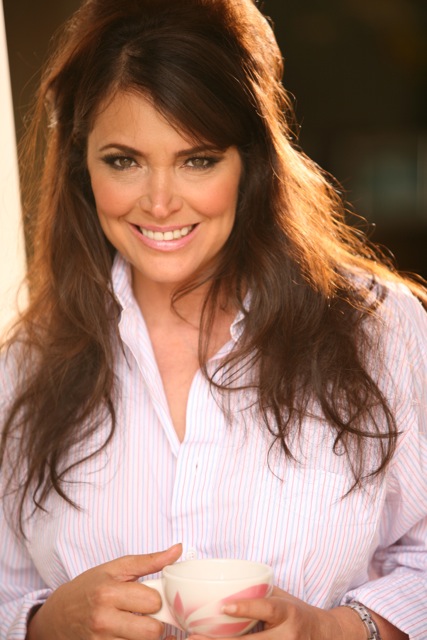
Cancer is a dreaded and deadly disease that is killing millions of women each year. Breast cancer took my mother at age 50 and since then I have had annual mammograms each and every year because early prevention is the key. However Ovarian cancer is harder to detect and cure and many women are losing their battle to this disease each year.
When I heard that Pierce Bronson's daughter recently died of ovarian cancer at the tender age of 43, the same disease that also took her mother around the same age, I felt compelled to write about this and feature it here for women to take notice. It struck a cord in my inner being because my own mother was taken from me at age 50 of breast cancer and I too have always had that number in back of my mind as a number to fear. I thought about Charlotte and how she must have wondered constantly about her mother's loss in her 40s. However, I chose to embrace the number 50 and celebrate instead of feeding it with fear. This is part of what inspired me to create woman to woman. Most women have a higher chance of getting either breast cancer or ovarian cancer after the age of 50. In fact, one out of every 8 women will get it and the chances are higher if a parent or sibling has died of it.
at the tender age of 43, the same disease that also took her mother around the same age, I felt compelled to write about this and feature it here for women to take notice. It struck a cord in my inner being because my own mother was taken from me at age 50 of breast cancer and I too have always had that number in back of my mind as a number to fear. I thought about Charlotte and how she must have wondered constantly about her mother's loss in her 40s. However, I chose to embrace the number 50 and celebrate instead of feeding it with fear. This is part of what inspired me to create woman to woman. Most women have a higher chance of getting either breast cancer or ovarian cancer after the age of 50. In fact, one out of every 8 women will get it and the chances are higher if a parent or sibling has died of it.
Hearing about a women losing their battles to this disease in their 40s is more rare, but not uncommon, especially when it comes to ovarian cancer, which is way harder to detect. So it's very important to get regular mammograms and OBGYN check ups. Recently I had a friend who told me she hadn't seen her OBGYN in several years! This is what happened to my mother, she never liked going to see the OBGYN and this is a must for women, especially women over 50, and I can't stress that enough. With a great organic diet, exercise and health check ups most of these things can be prevented. Women are living longer, healthier lives with this education. So please educate yourselves on the symptoms, see your doctor regularly, eat organically and stay healthy. You only have one body, take care of it!
My condolences to Pierce and his wife Keely, whom I ironically competed on Star Search with. She is a beautiful soul and a great support to this man who has lost so much, so soon. I wish their family peace and love through this tragic time in their lives

20% OF WOMEN CARRY A GENE WHICH CAUSES OVARIAN CANCER
- Ovarian cancer is the fifth most common cancer in women in the UK, with the lifetime risk of a woman developing it being about two per cent.
- Over 80 per cent of women diagnosed with ovarian cancer are over 50, though it can occur in younger women. The risk of cancer is increased for some women with a strong family history.
- If two or more of a woman’s first degree ‘blood relatives’ (i.e. mother, sister, daughter) have been diagnosed with ovarian or breast cancer, particularly before the age of 50, then the risk is significantly increased.
- Women who have one first-degree relative with breast cancer, diagnosed under the age of 40 or two first or second-degree relatives with breast cancer diagnosed over the age of 50, also have a slightly increased risk.
- Changes in two genes - called BRCA1 and BRCA2 - increase the risk of ovarian and breast cancer.
- Rarely, one of these genetic mutations runs in a family, and members of the family who inherit the gene have an increased risk of these cancers.
- However it is actually quite rare to develop cancer because of an inherited faulty gene, with only 5–10 per cent of cancers thought to be linked to one.
- In fact, up to 20 per cent of women carry a gene that can predispose them to it, Professor Hani Gabra, Director of the Ovarian Cancer Action Research Centre in London, told Mail Online.
- According to Macmillan Cancer, if a woman has only have one relative who was middle-aged or elderly when they developed ovarian cancer, or a relative with breast or ovarian cancer on each side of the family, a woman’s risk may not be significantly increased.
- Symptoms include: increased abdominal size and persistent bloating (not bloating that comes and goes), persistent pelvic and abdominal pain, difficulty eating and feeling full quickly, or feeling nauseous
For more information, visit the Ovarian Cancer Action website: http://www.ovarian.org.uk
 "You are what you eat."
"You are what you eat." 
 "You are what you eat."
"You are what you eat."  "You are what you eat."
"You are what you eat."  "You are what you eat."
"You are what you eat."  "You are what you eat."
"You are what you eat."  at the tender age of 43, the same disease that also took her mother around the same age, I felt compelled to write about this and feature it here for women to take notice. It struck a cord in my inner being because my own mother was taken from me at age 50 of breast cancer and I too have always had that number in back of my mind as a number to fear. I thought about Charlotte and how she must have wondered constantly about her mother's loss in her 40s. However, I chose to embrace the number 50 and celebrate instead of feeding it with fear. This is part of what inspired me to create woman to woman. Most women have a higher chance of getting either breast cancer or ovarian cancer after the age of 50. In fact, one out of every 8 women will get it and the chances are higher if a parent or sibling has died of it.
at the tender age of 43, the same disease that also took her mother around the same age, I felt compelled to write about this and feature it here for women to take notice. It struck a cord in my inner being because my own mother was taken from me at age 50 of breast cancer and I too have always had that number in back of my mind as a number to fear. I thought about Charlotte and how she must have wondered constantly about her mother's loss in her 40s. However, I chose to embrace the number 50 and celebrate instead of feeding it with fear. This is part of what inspired me to create woman to woman. Most women have a higher chance of getting either breast cancer or ovarian cancer after the age of 50. In fact, one out of every 8 women will get it and the chances are higher if a parent or sibling has died of it.